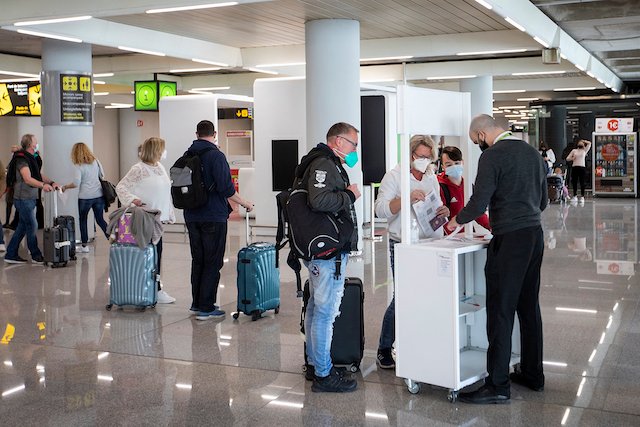Swiss heath experts predict that numbers will continue to soar, with 1,000 daily infections expected in the coming days.
The country has not seen such high numbers since the beginning of the pandemic in 2020.
As most cases are attributed to tourists returning to Switzerland from abroad, the Task Force, which acts as an advisory body to the Federal Council, is calling for stricter entry measures to curb the spread of coronavirus.
READ MORE: Returning tourists fuel Zurich’s Covid case spike
Currently, fully vaccinated tourists can come to Switzerland without having to test or quarantine. Those who have not had their shots or recovered from Covid must have a negative test result, and arrivals from the UK, India and Nepal — the so-called “high-variant countries” — are required to quarantine as well.
What does the Task Force want?
The new rules would be based on four colours — green, red, purple and grey — which would be assigned to countries according to their epidemiological situation.
Green countries would be the safest, where the 14-day case incidence is less than 60 per 100,000 people.
Red would be assigned to nations where the incidence exceeds 60 (as is the case with Switzerland), and purple to those where a new “disturbing” variant is circulating.
Grey countries would be the ones where the number of tests carried out among the population is too low to accurately assess the state of the pandemic there.
The Task Force recommends that unvaccinated people must have a negative test result and also be subjected to quarantine when arriving from red, purple or grey countries.
It is also calling for more rigorous tracing. This would mean that unvaccinated people arriving in Switzerland would be required to download and activate the Swiss Covid app.
In addition, anyone tested positive should have the results sequenced to determine which variant was the source of the contamination.
Will the government implement these rules?
At this point, there is no official response to the Task Force’s recommendations and there are no imminent plans to implement new restrictions.
In May, the Federal Council set out the criteria under which new measures would become necessary.
Among them is the condition that the 14-day rate of infections must remain under 600 for 100,000 people. As of Thursday July 22nd, it was 81.89.
As a comparison, during the peak of the pandemic in June 2020, that number was 7,830.
Another criterium is that occupancy of the beds in the intensive care units by Covid patients doesn’t exceed 300 over a 14-day period. Currently, that number is 30.
Some experts say the surge in numbers is not a cause for concern.
“I am not worried at all”, Daniel Koch, who headed the infectious disease section at the Federal Office of Public Health (FOPH) at the beginning of the pandemic, said in an interview.
“The increasing incidence figures depend on many factors, including the number of tests”, he noted.
Koch added that to keep infections from rising and avoid new restrictions, “it is important that the vaccination numbers are significantly higher by autumn and winter”.
READ MORE: Why Switzerland is not considering new measures despite rising Covid case numbers



 Please whitelist us to continue reading.
Please whitelist us to continue reading.
Member comments